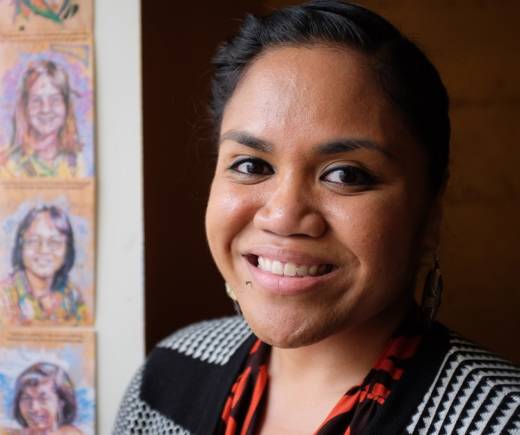Terisa Siagatonu is a poet and mental health advocate who works with young people. She grew up in San Francisco, but her family is from Samoa, in the Pacific Islands. She says to be from Samoa is to be from water, and that this belonging with water is shifting because of climate change. We talked to her for our series, This Moment on Earth, about how climate change has impacted people’s lives in personal and specific ways.
This is Terisa Siagatonu’s Moment.
Water, for me, equates to belonging, or the sense of belonging, the sense of home. Because I know my home and my homeland is in the water.
But the water is also a threat. There’s now such a thing as a climate change refugee, and I see that amongst my community of folks having to leave where they’re living, because the sea levels are rising and they literally cannot survive.
It’s hard to imagine being hopeful when you know that there are very real things happening to the place that you’re from. I imagine having children one day and wondering, can I bring them with me to visit Samoa? Will it still be there or will it be underwater?
Will the only things I have to understand my culture and my identity be the books that my grandpa wrote, and the limited knowledge I have from what was passed down to me? And so, I get really scared. I get really nervous about what legacy will be left for future generations in my community.
I think the poet is responsible for making what is typically taboo or typically off-limits to talk about — make it to make it possible to talk about, and make it accessible. Especially right now in regards to climate change — I see poetry, I see it literally as medicine.
Atlas
If you open up any atlas
and take a look at a map of the world,
almost every single one of them
slices the Pacific Ocean in half.
To the human eye,
every map centers all the land masses on Earth
creating the illusion
that water can handle the butchering
and be pushed to the edges
of the world.
As if the Pacific Ocean isn’t the largest body
living today, beating the loudest heart,
the reason why land has a pulse in the first place.
The audacity one must have to create a visual so
violent as to assume that no one comes
from water so no one will care
what you do with it
and yet,
people came from land,
are still coming from land,
and look what was done to them.
When people ask me where I’m from,
they don’t believe me when I say water.
So instead, I tell them that home is a machete
and that I belong to places
that don’t belong to themselves anymore,
broken and butchered places that have made me
a hyphen of a woman:
a Samoan-American that carries the weight of both
colonizer and colonized,
both blade and blood.
California stolen.
Samoa sliced in half stolen.
California, nestled on the western coast of the most powerful
country on this planet.
Samoa, an island so microscopic on a map, it’s no wonder
people doubt its existence.
California, a state of emergency away from having the drought
rid it of all its water.
Samoa, a state of emergency away from becoming a saltwater cemetery
if the sea level doesn’t stop rising.
When people ask me where I’m from,
what they want is to hear me speak of land,
what they want is to know where I go once I leave here,
the privilege that comes with assuming that home
is just a destination, and not the panic.
Not the constant migration that the panic gives birth to.
What is it like? To know that home is something
that’s waiting for you to return to it?
What does it mean to belong to something that isn’t sinking?
What does it mean to belong to what is causing the flood?
So many of us come from water
but when you come from water
no one believes you.
Colonization keeps laughing.
Global warming is grinning
at all your grief.
How you mourn the loss of a home
that isn’t even gone yet.
That no one believes you’re from.
How everyone is beginning
to hear more about your island
but only in the context of
vacations and honeymoons,
football and military life,
exotic women exotic fruit exotic beaches
but never asks about the rest of its body.
The water.
The islands breathing in it.
The reason why they’re sinking.
No one visualizes islands in the Pacific
as actually being there.
You explain and explain and clarify
and correct their incorrect pronunciation
and explain
until they remember just how vast your ocean is,
how microscopic your islands look in it,
how easy it is to miss when looking
on a map of the world.
Excuses people make
for why they didn’t see it
before.
Terisa Siagatonu is an award-winning poet, teaching artist, mental health educator, and community leader born and rooted in the Bay Area. A queer Samoan woman and activist, Siagatonu has spoken and performed at the White House and the UN Conference on Climate Change in Paris. In 2012, she received President Obama’s Champion of Change Award for her activism as a spoken word poet/organizer in her Pacific Islander community. Her Moment was recorded and produced by Peter Arcuni and Becky Hoag.
